What is the difference between zucchini and squash: the difference in appearance, taste and other parameters
Zucchini and squash belong to the same family and are varieties of common pumpkin. Squash is also called dish pumpkin. In many ways, both cultures are similar to each other. Both are rich in vitamins and trace elements, have hypoallergenic properties, therefore they are often used in dietary and baby food. They are fried, steamed, stewed, stuffed and pickled.
But they also have differences, which will be discussed in the article.
The content of the article
Differences between zucchini and squash
So, let's study the differences between cultures.
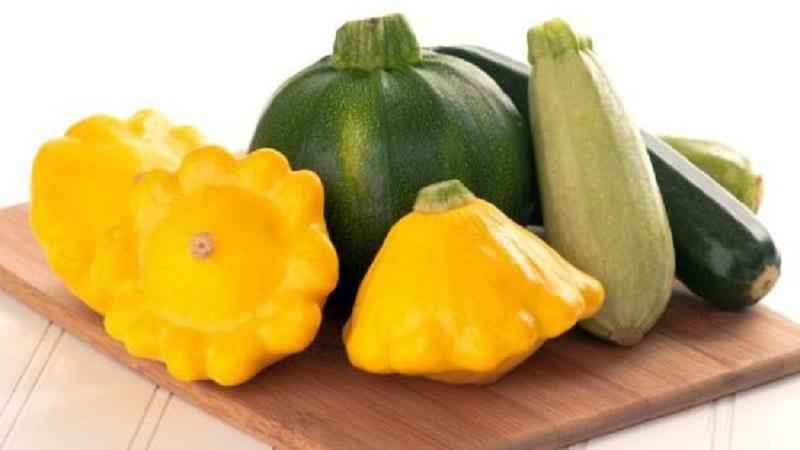
Appearance
The main difference between zucchini and squash in the form of fruits: zucchini are oblong, and squash are dish-shaped. The color of the fruit is very different: yellow, green, white and even black. Sometimes stripes or blotches are visible on the peel.
The bushes of the plants are very similar - large green leaves on thick stems... But zucchini, unlike the squash, can also have a creeping shape, like a pumpkin. Flowers - almost the same: large, bell-shaped, bright yellow or bright orange.
Taste qualities
Both of these vegetables are eaten unripe, the smaller the fruit, the better.... If you can still eat zucchini, while the seeds inside are not too grown, then squash is eaten only "young". The grown fruits become very tough and are no longer suitable for eating.
What is the difference in taste? Many people believe that the taste of squash is more intense.... Zucchini do not have their own distinct taste and therefore go well with other products. The taste of squash is always felt, no matter what products it is mixed with.
It will be interesting:
How to make delicious crispy lightly salted zucchini in a bag
Composition and properties
The composition of vegetables is not much different from each other.... Both are more than 90% water and are low-calorie foods, but the pulp of the squash is denser.
100 g of zucchini contains:
- calories - 24 kcal;
- proteins - 0.6 g;
- fats - 0.3 g;
- carbohydrates - 4.6 g;
- dietary fiber - 1.0 g;
- water - 93 g.
100 g of squash contains:
- calories - 19 kcal;
- proteins - 0.6 g;
- fats - 0.1 g;
- carbohydrates - 4.1 g;
- dietary fiber - 1.3 g;
- water - 92 g.
The properties of these two products are almost identical, so they can easily replace each other if necessary.... The only difference is in the details. Zucchini cooks faster and can be consumed at a young age even raw. Patissons, which have a denser pulp, are eaten only after heat treatment.
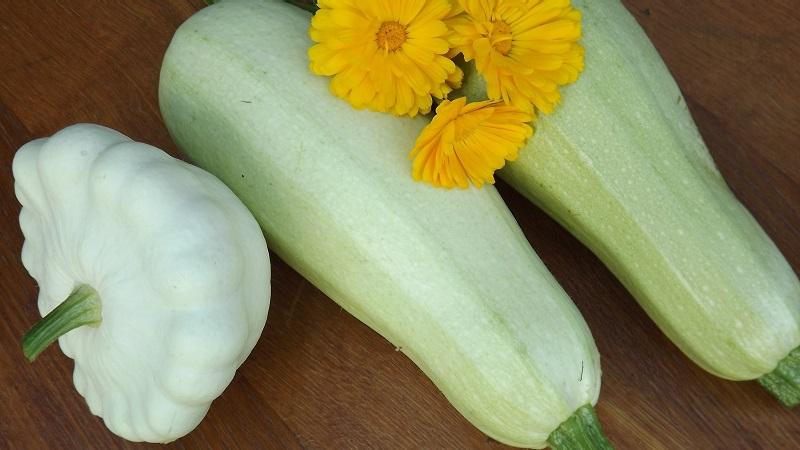
Benefit and harm
The benefits of these vegetables have long been beyond doubt.... These are dietary products that are actively used both for baby food and for people suffering from various diseases. Many diets have been developed on their basis. Both are high in vitamin C and are rich in many beneficial trace minerals such as potassium, calcium, phosphorus and magnesium.
What is the difference? IN the composition of the squash is quite a lot of copper and more than in zucchini, vitamin C... It has a lower calorie content. Therefore, squash is often recommended for people with obesity, various anemias and heart disease. Zucchini has more potassium and calcium, but less magnesium.
Important! All useful substances are preserved only with minimal heat treatment.
There is no particular need to talk about the dangers of these vegetables., since they are perfectly absorbed by the body and have a lot of advantages. But, like any product, there are contraindications.
Patisson is a mild laxative, therefore it can be harmful in acute intestinal disorders.... People with kidney and gallbladder diseases are advised to consume it in small amounts, as the oxalates in its composition can lead to the formation of stones.
Zucchini has no such disadvantages... But there is one thing: this vegetable is often grown with the use of pesticides, and when eaten raw, it can be harmful. Therefore, it is better to heat the zucchini from the store, and in raw form for salads it is better to use the fruits grown on your site.
Another unpleasant property of zucchini is that they sometimes taste bitter, like cucumbers.... This is due to the accumulation of special substances in the fruits - curcubitacins, which have a toxic effect and can harm the body. The reasons for this unfortunate phenomenon are: insufficient watering, lack of sunlight and the use of some mineral fertilizers. Therefore, it is better not to eat bitter zucchini, but throw it away immediately.
Read about other vegetable crops:
Almost all canned foods have contraindications... In pickled form, these vegetables are undesirable for people with diseases of the kidneys, gastrointestinal tract and cardiovascular system. Preservation significantly reduces the amount of vitamins and nutrients in foods, and excess salt leads to the formation of edema and kidney stones.
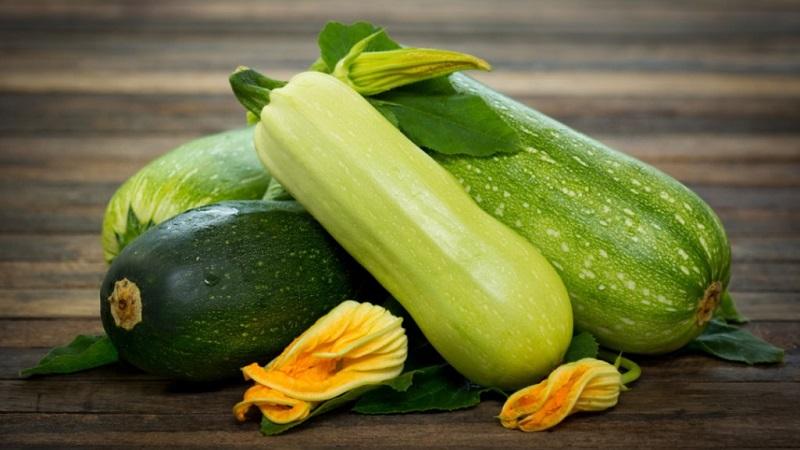
Growing and care
The cultivation of these vegetables is usually straightforward and practically the same.... Both plants love good, fertile soil, rich in potassium and magnesium. On acidic soil, before planting, the soil is limed with dolomite flour.
For the beds, open sunny areas are chosen so that under the large leaves of plants the fruits are well warmed up by the sun and grow quickly. Fertilizers are applied depending on the composition of the soil. Plants are afraid of frost and grow poorly at temperatures below 15 degrees.
Care consists in regular watering and timely fertilization... Both plants tolerate unfavorable conditions relatively easily and, unlike other vegetables, are resistant to diseases. If there is not enough sun, some leaves are removed from the bushes to ensure the normal development of the fruits.
What are the differences? Zucchini is more light-loving than squash, and cannot stand even light partial shade... Patisson loves more abundant watering. Zucchini grows faster and brings a greater yield, so many gardeners prefer it.
One of the types of courgettes - zucchini - brings especially rich harvest.... Other gardeners like squash more, which do not give the same yield, but have an unusual shape and a brighter taste. If both of these representatives of pumpkin are grown on the site, they are planted as far as possible from each other because of their ability to pollinate.
Application
The differences in the use of these two vegetables are determined their properties and appearance.
Zucchini have a less dense texture, cook faster, so their main purpose is zucchini or vegetable caviar... They are just as good to fry, stew, steam, use for preparing baby food or diet meals. However, in the marinade, they are significantly inferior to the squash both in taste and in appearance.
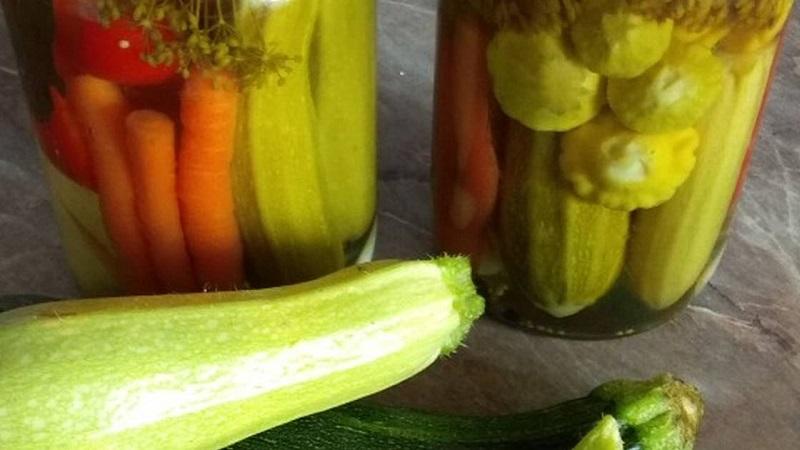
Patissons take a leading place in pickling... This vegetable seems to be created in order to show off in cans of preparations for the winter. Due to its dense consistency, marinated squash is crunchy when bitten and has an excellent taste.
It is also used in thermally processed vegetable salads, stewed or baked, and fried squash even surpasses zucchini in its taste.
How to distinguish
Consider how to quickly and accurately distinguish one culture from another.
Seeds
The seeds of squash and squash are very similar, but there is a slight difference.... If you compare them, it will be seen that the seed of the squash is round in shape, similar to the pumpkin seed, and that of the squash is more oblong.
If you do not hold both seeds in your hand, it is very difficult to identify them separately. Therefore, it is recommended to buy seed material only from trusted suppliers, so as not to grow squash instead of squash, and vice versa.
Bushes
Plant bushes are not so difficult to distinguish from each other.... Zucchini leaves are more pointed than that of squash, their lobed shape is more pronounced. Large silvery streaks are often visible on the dark green leaves of the squash. The squash does not have these veins, the shape of the leaves is more rounded, the color is slightly lighter.
Fruit
The fruits of squash and squash are difficult to confuse... Zucchini have an oblong shape similar to a large cucumber. If the zucchini fruit is not cut off in time, it grows to a rather impressive size, which significantly reduces its taste. The peel becomes hard, the seeds inside fill almost the entire space, and almost no pulp remains
The fruit of the squash has a more original shape.... To some it resembles a plate with wavy edges, to someone - a flower. The Russian name "patisson", borrowed from the French language, is derived from the derivative word "pie", which also emphasizes its unusual shape. The form is disc-shaped and bell-shaped. Squash fruits rarely grow larger than the palm. Due to their unusual appearance, they are consistently popular with gardeners.
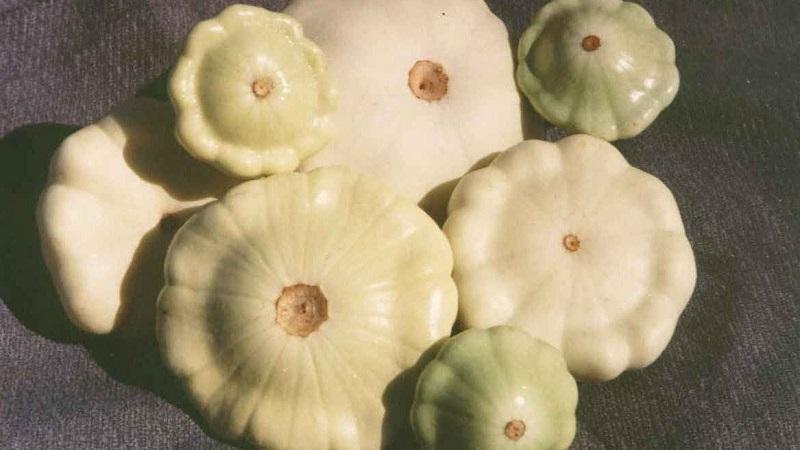
What are the similarities between zucchini and squash
The similarity of these vegetables is due to their belonging to the same family. - Pumpkin and even to one biological species - Common pumpkin. They are annual herbaceous plants with thick stems and large green lobed leaves.
The fruits have approximately the same composition and are widely used for food.... Both those and others are used unripe. These plants have the same growing conditions, a common love for the sun and abundant watering.
Conclusion
Both squash and squash are relatively unpretentious plants that give a good harvest and have rightfully won the love of gardeners and gardeners. Due to their remarkable properties, they are widely used to prepare a wide variety of dishes and are harvested for the winter. Which vegetable to give preference to - everyone decides for himself.